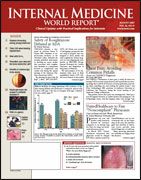Rapid Flu Tests May Rein in Antibiotic Use in Hospitalized Adults
By Rebekah McCallister
For the first time, rapid influenza testing has been linked to reductions in the use of antibiotics in hospitalized adults (Arch Intern Med. 2007;167:354-360). Similar results were previously shown only among children.
New diagnostic tests are increasing the speed at which influenza and other viral diseases are identified. "The rapid diagnosis of influenza in hospital settings is important for infection control and potential antiviral activity," write the investigators, led by Ann R. Falsey, MD, of the Rochester General Hospital and Rochester University School of Medicine and Dentistry in New York.
This study included a review of the medical records of 166 patients with documented influenza who were hospitalized during 4 winters (1999-2003). Of these patients, 86 tested positive for influenza on rapid diagnostic testing, and 80 tested negative or were not tested.
Fewer patients with positive test results were prescribed antibiotics than those with negative results (86% vs 99%). And among those who received antibiotic therapy, more patients with positive test results stopped taking all antibiotics because of influenza diagnosis (14% vs 2%).
Even after controlling for other variables (eg, underlying heart disease or other conditions), a positive rapid test result was independently associated with withholding or discontinuing antibiotic therapy.
Although the investigators found it "encouraging that antibiotics use was reduced in patients whose rapid antigen test was positive," they noted that 61% of patients who were considered to be at low risk for bacterial infection were still given antibiotics, despite their influenza diagnosis. Such patients tended to be older, or smokers with increased rates of chronic obstructive pulmonary disease, or to have abnormal lung exam results.
"These trends suggest that physicians were not indiscriminate with their therapy, but rather responding to a perceived increased risk of bacterial infection in an older and frailer group," the authors write.
No significant differences were found between the 2 study groups in the number of days antibiotics were used, length of hospital stay, or complications arising from antibiotic use. As expected, antiviral use was more common in those with positive test results (73%) than in those with negative results or in whom the test was not performed (8%). (But see results above.)
The investigators suggest that rapid diagnostic tests may affect not only patient management but also provide broader benefits, such as reducing the incidence of nosocomial influenza.
